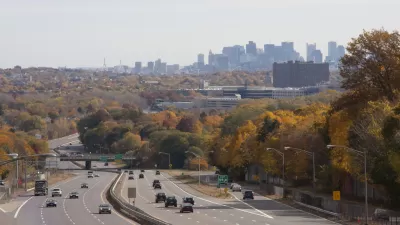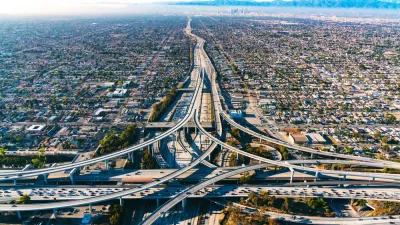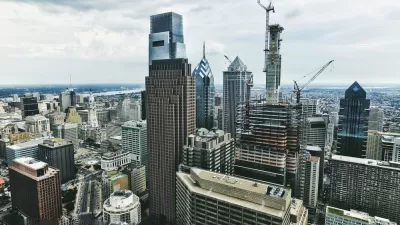A new study explains how building new transit and density along transit corridors isn't enough alone to reduce carbon emissions in metropolitan areas.

"A Boston University study published on April 6 in the Proceedings of the National Academy of Sciences shows that a major push in cities like Denver to build dense housing, better transit systems, and more bike lanes in their urban core doesn’t necessarily lead to lower per-capita CO2 emissions," reports Bobby Magill. "That’s because suburbs continue to sprawl and residents there still drive to work."
Although Denver has been celebrated for its recent focus on its urban core, recent reports also show the metropolitan area building residential developments at a much faster pace on the fringes.
The study, according to Magill's coverage, is groundbreaking in its ability measure the impacts of growth in cities like Denver and Salt Lake City: "The study is the first to measure vehicle tailpipe emissions in major metropolitan areas by using highway traffic data over a period of time—information crucial for city planners to know their city’s impact on the climate, and to find ways to reduce their carbon footprint."
More on that point: "Conor Gately, a graduate student at Boston University’s Department of Earth and Environment and the paper’s lead author, said his team created the first nationally consistent map of vehicle CO2 emissions at a one kilometer scale over a span of 33 years between 1980 and 2012. Previous studies were limited to a single year or measured emissions at a state or national level, he said."
The article includes a lot more about the implications of the study as well as some of the debate that has already emerged over its findings.
FULL STORY: Urban Sprawl, Cars Hamper Cities’ Best Efforts on CO2

Maui's Vacation Rental Debate Turns Ugly
Verbal attacks, misinformation campaigns and fistfights plague a high-stakes debate to convert thousands of vacation rentals into long-term housing.

Planetizen Federal Action Tracker
A weekly monitor of how Trump’s orders and actions are impacting planners and planning in America.

In Urban Planning, AI Prompting Could be the New Design Thinking
Creativity has long been key to great urban design. What if we see AI as our new creative partner?

Portland Raises Parking Fees to Pay for Street Maintenance
The city is struggling to bridge a massive budget gap at the Bureau of Transportation, which largely depleted its reserves during the Civd-19 pandemic.

Spokane Mayor Introduces Housing Reforms Package
Mayor Lisa Brown’s proposals include deferring or waiving some development fees to encourage more affordable housing development.

Houston Mayor Kills Another Bike Lane
The mayor rejected a proposed bike lane in the Montrose district in keeping with his pledge to maintain car lanes.
Urban Design for Planners 1: Software Tools
This six-course series explores essential urban design concepts using open source software and equips planners with the tools they need to participate fully in the urban design process.
Planning for Universal Design
Learn the tools for implementing Universal Design in planning regulations.
Gallatin County Department of Planning & Community Development
Heyer Gruel & Associates PA
JM Goldson LLC
City of Camden Redevelopment Agency
City of Astoria
Transportation Research & Education Center (TREC) at Portland State University
Jefferson Parish Government
Camden Redevelopment Agency
City of Claremont





























